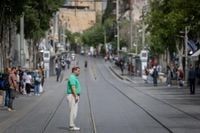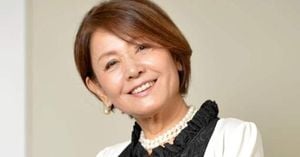On the evening of April 23, 2025, U.S. President Donald Trump issued a proclamation recognizing Israel’s Holocaust Remembrance Day, known as Yom HaShoah, honoring the memory of six million Jews murdered by the Nazis during World War II. "On Yom HaShoah, Holocaust Remembrance Day, and during this week of solemn remembrance, we honor the blessed memories of the six million Jewish men, women, and children who were viciously slaughtered by the genocidal Nazi regime and their collaborators — one of the bleakest hours in human history," Trump stated.
This year’s observance of Yom HaShoah comes amid heightened tensions following the Hamas-led terror attacks on Israel on October 7, 2023, which left 1,200 people dead and resulted in the abduction of 251 individuals, with 59 still held hostage in Gaza. The annual commemoration, observed primarily in Israel and by Jewish communities worldwide, typically falls in April or May, on the 27th of Nisan in the Hebrew calendar.
In his statement, Trump emphasized the ongoing threat of antisemitism, particularly in light of the recent violence. He warned of a disturbing rise in antisemitic incidents across the United States, especially on college campuses, which he labeled as "leftist, anti-American." He reaffirmed his administration’s commitment to combating antisemitism through an executive order aimed at addressing anti-Jewish harassment with all necessary legal force.
“The poison of antisemitism tragically still exists,” Trump remarked, pledging to confront hatred and discrimination. He reiterated his stance during his 2024 presidential campaign, where he vowed to deport non-citizens expressing support for Hamas and other antisemitic terrorist organizations. "We will deport the foreign jihad sympathizers, and we will deport them very quickly. And Hamas supporters will be gone," he declared.
The U.S. Citizenship and Immigration Services (USCIS) has announced plans to monitor social media for antisemitic speech, using it as a basis for denying permanent residency and immigration benefits. Critics, however, argue that these measures infringe on free speech rights.
On the same day, Israel commemorated Holocaust Remembrance Day with ceremonies in the country and in Poland. The official ceremony began at Yad Vashem, the world's most renowned Holocaust museum in Jerusalem, attended by Israeli officials, ambassadors, and Holocaust survivors. Prime Minister Benjamin Netanyahu, who arrived late due to a security incident, drew comparisons between Hamas and the Nazis, stating, "They want to kill, to destroy all the Jews." He emphasized the existential threat posed by Hamas, which has been designated as a terrorist organization.
During the ceremony, Netanyahu recounted the story of his father-in-law, Shmuel Ben-Artzi, who immigrated to Israel in 1933, leaving his family behind in Poland. He shared the heart-wrenching reality that his entire family perished during the Holocaust. "Shmuel passed away at the age of 97, but throughout his entire life, even during the last days before he passed away, whenever I mentioned Yehudit’s name he would cry. He always cried," Netanyahu reflected.
At Yad Vashem, Holocaust survivor Gad Fartouk, who lit one of six memorial torches, made an emotional plea for the return of hostages still held by Hamas. "It felt empty not to mention the 59 hostages — some 20 of them believed to still be alive — still held by Hamas in Gaza," he said, highlighting the ongoing suffering of families affected by the recent violence.
As part of the observance, a two-minute siren brought Israel to a standstill, with drivers halting their vehicles and pedestrians remaining silent in remembrance. This was followed by a wreath-laying ceremony attended by Netanyahu and other dignitaries. The day culminated in the annual “Every person has a name” event at the Knesset, where lawmakers read aloud the names of Holocaust victims.
In a poignant reminder of the past, President Isaac Herzog noted the paradox of saying "never again" while acknowledging the 59 hostages currently in Gaza. Defense Minister Israel Katz echoed this sentiment, stating that Hamas operates with the same malice as the Nazis and is part of an "Iranian axis of evil" that seeks to destroy Israel.
In a related event, the 37th annual March of the Living took place in Poland, where thousands of participants walked alongside Holocaust survivors from Auschwitz to Birkenau. Among those present were released hostages and families of victims of the Hamas attacks. Shelly Shem Tov, mother of a released hostage, expressed her conviction in attending the march, reflecting on the harrowing stories of families who sought refuge during the recent attacks.
"I was right to come here and hear the stories and see the pictures and the exhibits of mounds of eyeglasses," Shem Tov stated, drawing parallels between the Holocaust and the current crisis. She recounted the desperate cries from hostages, emphasizing the urgent need to bring them home and heal the nation.
As Israel and the Jewish community worldwide reflect on the horrors of the Holocaust, the events of the past week have underscored the continuing relevance of remembrance and the fight against hatred and antisemitism. The juxtaposition of memorializing the past while confronting present-day threats serves as a stark reminder of the lessons that must not be forgotten.




